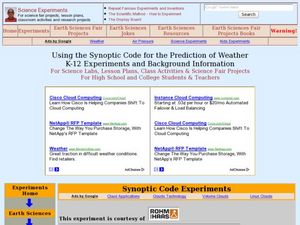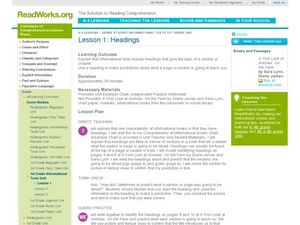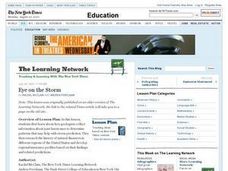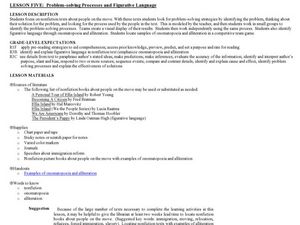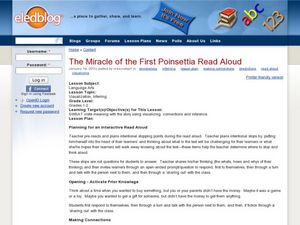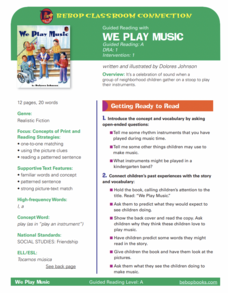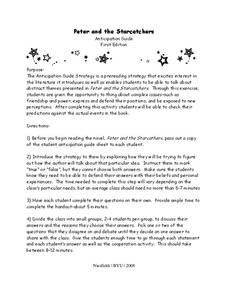Curated OER
Using the Synoptic Code for the Prediction of Water
Students construct a thermoscreen for the experiment. In this earth science instructional activity, students make observations and interpret them using synoptic codes. They predict the weather based on gathered information.
Curated OER
Headings
First graders discover how heading help us make predictions. The class discusses how informational text typically has heading that can aid them in determining what a chapter will be about. They read the heading and make predictions for...
Curated OER
Red Herrings
Sixth graders make predictions while reading The Westing Game. In this prediction and mystery lesson, 6th graders identify red herrings while reading and compare those clues with their predictions. Students complete a series of...
Curated OER
Guided Reading: Jump Rope
Students blend phonemes to decode words. In this guided reading lesson, students evaluate different comprehension strategies to aid reading. Students make predictions based on picture clues and use patterned sentences to facilitate...
Pennsylvania Department of Education
Analyzing Key Ideas and Details in Nonfiction
Students explore nonfiction texts. In this language arts lesson, students read a nonfiction text and make predictions. Students identify facts and opinions in the text and draw conclusions as they read.
Curated OER
Guided Reading Lesson: Here Comes the Bus
Students discover basic concepts of print. In this early literacy lesson, students discover basic high frequency words. Students make predictions as they read. Cross-curricular activities provided.
Curated OER
Why Predict?
Twelfth graders examine the process of predicting. They observe a fine art transparency, discuss their predictions about the artwork, identify the types of predictions made during a weather broadcast, and evaluate headlines from...
Curated OER
Which Side to Choose? An Exercise in Choices and Ethics
Learners evaluate their reaction to a series of statements to investigate that personal choices are based on personal goals, peer and social pressures, ethic and religious beliefs, and the knowledge of biological consequences. This is...
Curated OER
Eye on the Storm
Young scholars discover the way geologists collect information about past hurricanes to determine patterns that may help with storm prediction. They then research the history of natural disasters in different regions of the United States...
Curated OER
Using the Synoptic Code for the Prediction of Weather
Young scholars interpret the synoptic code. They construct a thermoscreen with an anemometer. Students identify different types of clouds and understand and read barometric pressure. Young scholars predict weather pattern as they apply...
Jessica Winston
Gingerbread Friends Lesson Plan Guide
Full of activities for Jan Brett's story "Gingerbread Friends," this resource will get your kids in the mood for some snacks, fortify their need for vocabulary, and fill their minds with story elements.
Curated OER
Zoom Broom
Learners explore comprehension strategies as they listen to Zoom Broom by Margie Palatini. As the story is read, teacher and pupils will stop occasionally to make text-to-text, text-to-self, or text-to-world connections. They also...
Institute of Electrical and Electronics Engineers
Insulators and Conductors
In a classic activity, emerging electricians test various objects for electrical conductivity in a circuit. Each group constructs a simple circuit by following a diagram. Predictions are made and objects are inserted into the circuit,...
Curated OER
Pairing Picture Books with Edith Hamilton's Mythology
As a before reading strategy, class members select a tale from mythology, examine several picture book versions of the myth, and fill out part of a Venn diagram with observations about the hero in particular and the myth in general.They...
Curated OER
Problem-Solving Processes and Figurative Language
Nonfiction texts about people on the move provide young readers with an opportunity to examine not only the problem-solving strategies employed by immigrants, but to also find examples of figurative language these writers use to tell...
Curated OER
The Miracle of the First Poinsettia
Connecting to literature and learning how to infer are two great reading strategies everyone needs to know. Here, the class will read along with the story The Miracle of the First Poinsettia, review folktales as a genre, and make...
Mary Pope Osborne, Classroom Adventures Program
Mummies in the Morning Egyptian pyramids, hieroglyphics
Visit the Magic Treehouse and take your class on a trip through time with a reading of the children's book Mummies in the Morning. Using the story to spark an investigation into Egyptian culture, this literature unit engages...
Curated OER
Predict, Draw Conclusions
Learners discuss times they predict what will happen next. They compare this to using the information given in a piece of literature to predict what will happen next in the story. Students listen as the teacher reads an excerpt from The...
Curated OER
the Little Red Riding Hood
Students respond to the story of Little Red Riding Hood. For this Red Riding Hood lesson, students retell and discuss story elements. Students practice phonic sounds. Students role play, make predictions, use picture cards and practice...
Curated OER
Picture Clues and Repeated Text
Kids read The Grouchy Ladybug and predict what the outcome will be based on picture clues and repeated text. Next, they draw their predictions. A great way to use both prediction and context clue skills in your kindergarten class.
Curated OER
We Play Music
Do you like music? Have your youngsters read We Play Music, practicing select reading strategies, like using picture clues to determine new words. Then, after their first independent read, have them re-read the story to a partner,...
Institute for Teaching through Technology and Innovative Practices
The Right Number of Elephants
How can you tell if a number of items is reasonable? Combine math and language arts with a fun lesson based on Jeff Shepard's The Right Number of Elephants. After reading the book, kids discuss amounts of other items and create minibooks...
Curated OER
Peter and the Starcatchers: Anticipation Guide
Pique your pupils' interest before reading Peter and the Starcatchers with an anticipation guide. Given a list of 10 statements, learners choose true or false based on what they think the book is about. They then discuss in small groups...
EngageNY
Tracing the Idea of Fish Depletion: Chapter 1
Would you, could you? Scholars read World without Fish and focus carefully on the use of the words could and would. They chunk the text into smaller sections and write annotations on sticky notes to help with comprehension. To finish,...
Other popular searches
- Making Predictions Reading
- Predictions in Reading
- Making Predictions in Reading
- Reading Prediction Strategy
- Predictions Before Reading
- Reading Prediction Outcome
- Reading Prediction Skills
- Making Prediction in Reading
- Guided Reading Predictions
- Predictions Reading
- Prediction in Reading
- Prediction Reading


